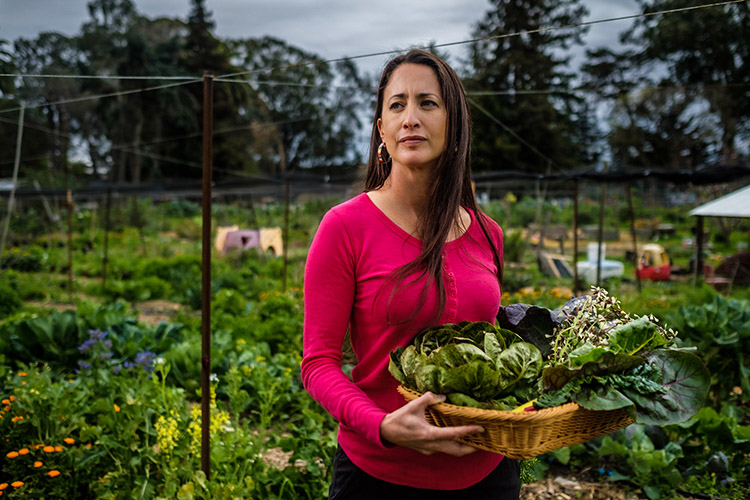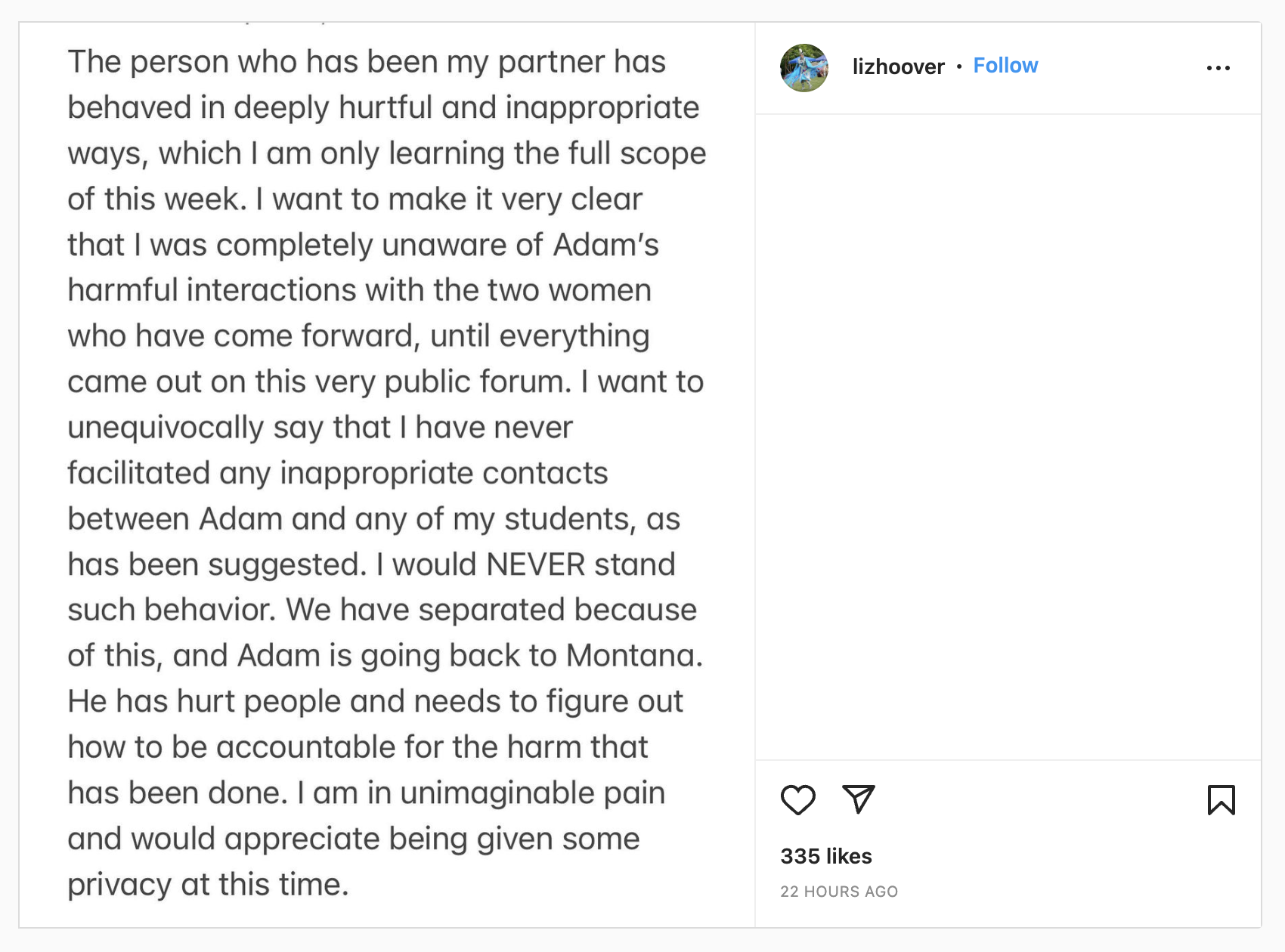Indianz.Com > News > Native food sovereignty figure admits no tribal connections

Native food sovereignty figure admits no tribal connections
Liz Hoover spent decades claiming to be Mohawk and Mi’kmaq
Friday, October 21, 2022
Indianz.Com
A scholar who has made a name for herself in Native food sovereignty circles has vowed to stop claiming to be of “Mohawk/Mi’kmaq descent” after looking into her background.
In a statement made public on Thursday, Elizabeth Hoover attributed her claims of being Mohawk and Mi’kmaq to family lore. She said her parents raised her to believe she was of “mixed” Native and non-Native ancestry.
“According to my mother, her grandmother was a Mohawk woman who married a French-Canadian man,” Hoover, who is more commonly known as Liz, said in a “Statement about Identity” posted on her newly-created website.
“My dad’s family said his grandma was Mi’kmaq, which was also something we were proud of but never quite as close to,” Hoover added.
But after conducting “genealogical research” into her New York-based family, Hoover concluded that she has no connections to the tribal communities she had been claiming for decades. She said the “new revelations” have led her to stop identifying herself as Mohawk and Mi’kmaq — which she has done publicly since her teenage years. “Now, without any official documentation verifying the identity I was raised with, I do not think it is right for me to continue to claim to be a scholar of Mohawk/Mi’kmaq descent, even though my mother is insistent that she inherited this history for a reason,” Hoover said in the statement. Despite the admission, Hoover avoided detailing her willingness to go along with the “stories” that she said she grew up hearing — even after obtaining advanced educational degrees in anthropology during her adult years. Left out of the statement, for instance, was an explanation of her long-term use of the supposed Mi’kmaq language name of Gomdineoeoeu Osaog. The name shows up in news accounts as early as July 1996, when Hoover was just 17 years old. She repeated the claim more than a decade later, while serving as a visiting scholar at a university in Pennsylvania where she taught about Native peoples in the anthropology department. “It means Mountain Flower in Mi’kmaq,” Hoover, then age 30, told Lancaster Newspapers in December 2009.Elizabeth (Liz) Hoover, professor at UC-Berkeley, is latest academic to admit to falsely claiming Indigenous identity. https://t.co/FUQOx3wIlU
— Darryl Leroux (@DarrylLeroux) October 21, 2022

After she was hired at the University of California, Berkeley, in time for the fall 2020 semester , the media arm of the world renown public land-grant institution described Hoover as a “relatively new Native American faculty member” and said she was one of “one of 11 self-identified Native American/Alaska Native ladder-rank faculty members at Berkeley.” She took pride in being a “cluster” hire meant to bring diversity to the campus, although the Berkeley News didn’t report her supposed tribal affiliations. Even with the omission of information that might explain why she is considered to be Native American, Hoover is now part of the leadership team at UC Berkeley’s Department of Environmental Science, Policy and Management. She serves as one of three division chairs in her department, with her area of focus listed as “Society and Environment.” And while Hoover in her statement indicated that she only recently looked into her family, her tribal claims have been the subject of considerable debate for much of the past year. In February, the Chi-Nations Youth Council, a group of young Native people in Chicago, Illinois, accused the scholar of “taking resources from Native people for years and lying about her ancestry.” Members of Chi-Nations became familiar with Hoover as she was an intimate partner of Adam Sings In The Timber, a photographer and citizen of the Crow Tribe who has long maintained a presence in Chicago, where had previously worked with the group. After he was publicly accused of sexual assault and sexual misconduct by young Native women, Hoover said she ended her relationship with him in a post on a social media account that has since been deactivated. But just like her new statement, Hoover left out key details about her dealings with Sings In The Timber, whose birth surname is Singer. She did not disclose that he was employed by UC Berkeley through its partner hiring program — meaning his presence on campus, in close proximity to young people, was directly linked to her status as faculty. “I want to unequivocally say that I have never facilitated any inappropriate contacts between Adam and any of my students, as has been suggested,” Hoover wrote on April 21. “I would NEVER stand such behavior.”Please join ESPM in welcoming Elizabeth Hoover, Sunaura Taylor, Youjin Chung, and Benjamin Blonder to our faculty team this fall! Read more about these four incoming professors' outstanding work: https://t.co/rQ9hJDjffL
— Berkeley Environmental Science, Policy & Mngmt (@ESPM_Berkeley) August 27, 2020


According to publicly available internet records, Hoover established her profelizabethmhoover.com website and domain in mid-August, just a few days before the start of the fall 2022 semester at UC Berkeley. Her “Statement of Identity” is highly visible — it can be accessed through an “Identity” menu item on the top of the site. Hoover characterized the disclosure as a way to explain why she never looked into her background until recently. She said she hoped that coming forward now would ensure that she might still be accepted by people around her — many of them who happen to be Native. “As such, I have been approaching my friends, collaborators, students, colleagues, and members of the general public, to share this information about my identity and to re-form these relationships as needed,” Hoover wrote. Yet a number of Native former collaborators have been trying to get Hoover to be more forthcoming about her background as far back as 2018, when she was about to publish her second book, and as recently as this summer. During both occasions, she appeared extremely reluctant to account for her actions, according to correspondence and messages seen by Indianz.Com. When the book was about to be published, she went so far as to remove the “Mohawk and Mi’kmaq ancestry” claim from official University of Oklahoma Press materials for the food sovereignty project. On the other hand, the two other lead contributors have their tribal affiliations prominently shown. More recently, Hoover said people who have been raising doubts about her background are the ones causing “damage.” Internet messages seen by Indianz.Com indicate that she considers herself a victim, even though she now admits her decades-long claims of being Mohawk and Mi’kmaq are unsupported by her own research. “People who don’t even know me have worked very hard to paint me as a liar and manipulator and I don’t know why,” Hoover wrote in a series of messages in which she again brought up her “useful” work in Native communities. “If there is damage that comes from all of this it’s because people are working hard to create that damage,” Hoover said.Hey @ESPM_Berkeley, NOW would be a great time
— Dr. Dr. Desi (she/her) (@native4data) October 21, 2022
to weigh in on the fraudulent Indigenous identity to which ESPM Professor Hoover has just admitted—a fraudulent Indigenous identity that has given her access to so much cultural knowledge and practice that you’re amplifying. 👀 https://t.co/xPqXiUD9LG
Related Stories
Search
Filed Under
Tags
More Headlines
President Trump vetoes tribal homelands bill with swipe at trust relationship
Native America Calling: The Pleiades star cluster ushers in winter story season
NAFOA: 5 Things You Need to Know This Week (January 5, 2026)
Native America Calling: Native in the Spotlight with Elaine Miles
Native America Calling: Gearing yourself up for 2026
Statement: Chairman of Miccosukee Tribe on veto of homelands bill
Native America Calling: Lumbee Nation secures its sovereign status
Chuck Hoskin: Cherokee Nation builds on tradition with technology
Native America Calling: The Year in Native News
Native America Calling: Native music in 2025
Native America Calling: Amid Greenland’s independence push, Denmark accounts for colonial blunders
Senate Committee on Indian Affairs sets business meeting and hearing
Native America Calling: Saving historic architecture and other important places
VIDEO: H.R.2400, the Pit River Land Transfer Act of 2025
VIDEO: H.R.3620, the Southcentral Foundation Land Transfer Act of 2025
More Headlines
Native America Calling: The Pleiades star cluster ushers in winter story season
NAFOA: 5 Things You Need to Know This Week (January 5, 2026)
Native America Calling: Native in the Spotlight with Elaine Miles
Native America Calling: Gearing yourself up for 2026
Statement: Chairman of Miccosukee Tribe on veto of homelands bill
Native America Calling: Lumbee Nation secures its sovereign status
Chuck Hoskin: Cherokee Nation builds on tradition with technology
Native America Calling: The Year in Native News
Native America Calling: Native music in 2025
Native America Calling: Amid Greenland’s independence push, Denmark accounts for colonial blunders
Senate Committee on Indian Affairs sets business meeting and hearing
Native America Calling: Saving historic architecture and other important places
VIDEO: H.R.2400, the Pit River Land Transfer Act of 2025
VIDEO: H.R.3620, the Southcentral Foundation Land Transfer Act of 2025
More Headlines